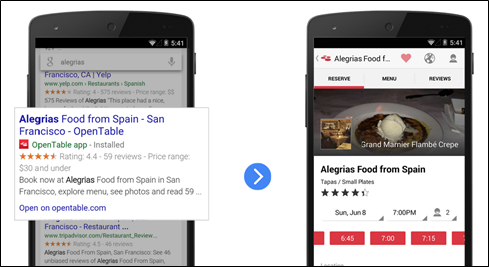What separates a successful mobile app from an unsuccessful one? Design, ease of use, demand, effectiveness, etc. all play their part.
The truth is, however, that effective marketing can make a huge difference between an app that is a commercial success and one that gets lost amongst the ever burgeoning crowd of daily released apps.
In addition to putting some marketing effort behind you app’s promotion, it’s incredible how many app developers and marketers aren’t aware of capabilities of mobile app such as what mobile deep linking is, never mind how to use it to benefit their marketing campaigns.
Let’s take a quick look at a few steps you can take to significantly enhance the success of your app through smarter marketing with deep links.
Mobile app deep links in search results allows users to click links to view specific content within your app, or download your app, depending on if they have your app installed. If a person doesn’t have your app installed and clicks on a deep link, they will automatically be directed to your app’s page in the App Store so they can download your app before proceeding to your deep link landing page within an app.
If a person doesn’t have the app installed and clicks on a deep link, they will automatically be directed to the app’s page in the App Store so the user can download the app before proceeding to the deep link destination. Deep linking helps simplify the conversion friction by shortening the users’ flow to the piece of content, product or promo they are interested in which convince user to a buyer.

Allowing your mobile app to be launched via a link is a necessary first step to making it accessible from the web. This enables promotional efforts (email, social posts, ads, etc.) to lead users directly into your mobile app which is typically a better and more seamless experience for your customers.
If your mobile app is already set up to handle a URI, you are ready to create optimized links that detect if the app is present on a user’s device and then takes them to the mobile app content they are looking for!
In short, a URI is really just a link. The most common kind is a web link (http://www.google.com) which when clicked instructs the browser to render a web page. A mobile app URI is another type of link that allows a user to launch an app—not just a browser—when clicked; for example, youtube:dQw4w9WgXcQ will bring up a video in the YouTube app if it is installed. On both iOS and Android, any mobile app can indicate that it handles URIs, and for this reason, URIs are an ideal mechanism by which mobile apps can be launched from the web.
For apps such as shopping, travel, hotel booking, music and news the ability to send users to a specific product, offer or promo page can have tremendous effect over conversion rates and ultimately revenues. For example, if deep linking is enabled, the user can be navigated directly to a certain hotel booking page for which he has seen an advertisement instead of the app’s home page.
Does deep linking works only for users that have the app already installed? Not true.
Deep linking benefits both pre-installed and new users. There are programs that can carry forward the saved request. If the user doesn’t have the app installed, he/she is sent to the App store and, upon opening the app after the installation, is directly taken to the deep linked page for the user requested content.
Even though deep linking is only used as a re-engagement mechanism to bring users back inside the app, it has an enormous potential to drive conversions and ROI.
Deep linking helps every mobile app which has multiple screens, products or sections to offer for the interested customer. This means that instead of making every user open your app’s main screen and then manually navigate, deep links can take them directly to the desired page.
There are a number of reasons why mobile deep linking is incredibly important.
Deep linking:
Google also provided a list of best practices to consider when adding deep links to your app:
Mobile web use has been declining, while mobile app use continues to spike, now occupying 86% of the average US mobile consumer’s time. If deep links weren’t a part of your mobile engagement strategy before, it’s time to consider adding them. As mobile app use rises, deep links gain traction. Right now, they make for better app discovery, engagement and conversion with richer opportunities. In the future, when deep links are adopted at scale, they will make navigating between apps similar to how we navigate between web browsers, with more fluid pathways.
Blog contributed by Rajkumar Raju, Assistant Manager-SEO, Position2 Inc.